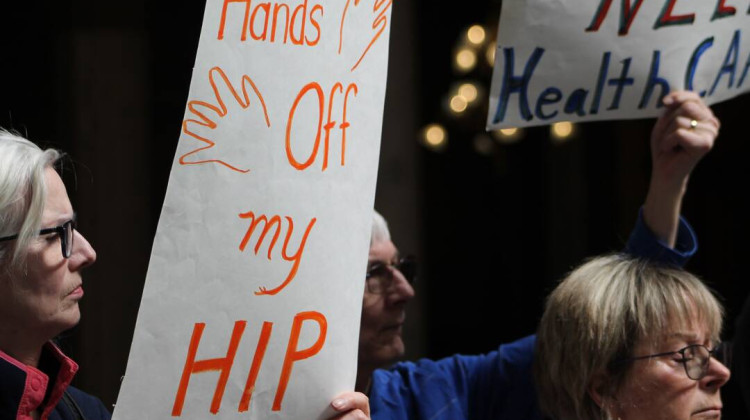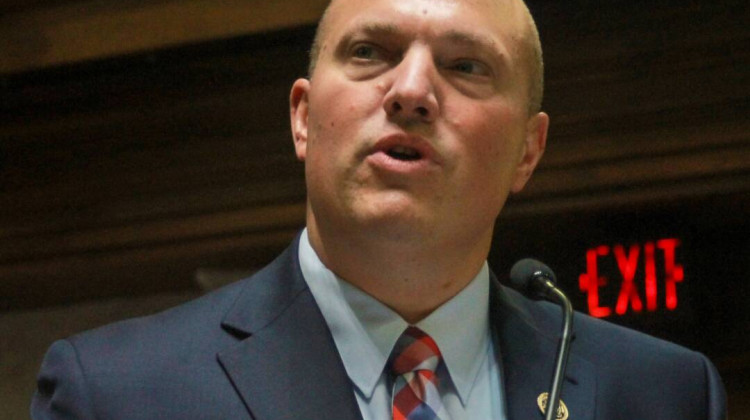
Sara Willette of Ames, Iowa, runs an independent website tracking and analyzing the state's COVID-19 data.
Natalie Krebs/Side Effects Public MediaThere’s a lot of COVID-19 data available through state and federal resources. But those numbers can be confusing or raise questions. That’s inspired some people to do their own data-tracking.
Every morning, Sara Willette logs onto Twitch, a platform typically used for livestreaming games, and gets to work, livestreaming spreadsheets.
Willette lives in Ames, Iowa, and spends hours every day creating tables and graphs for her own COVID-19 website. She says it presents data in a way that’s much easier to grasp than on the state’s official website.
"So they don't have to go jump into a tiny link at the bottom of the main page to see how many hospitalizations there are in their county. They don't have to calculate out what percentage of their county is infected," she says. "These are, these are data points, statistics that are missing on the state’s site."
Willette has been collecting data since Iowa announced its first COVID-19 cases in March. She has a rare immunodeficiency that makes her more susceptible to getting sick, and the information eases her anxiety. She thinks it does the same for others because her site gets thousands of hits daily.
"There's a lot of us who are data literate that facts and science and data makes us think more clearly. And understand whether or not it's safe to go to the grocery store on a Tuesday," she says.
Willette isn’t the only person who has spent hours analyzing COVID-19 numbers around the country.
In March, a pair of journalists teamed up with a software developer to launch the COVID Tracking Project. They currently have hundreds of volunteers who update their website with figures across the country.
And as the new academic year started, a Kansas teacher built a nationwide database of COVID cases at schools. After it went viral, the National Education Association took over her project.
Dana Jones is another data detective. The nurse practitioner in eastern Iowa made national headlines in August when she revealed a glitch in the state’s COVID-19 tracking system. She discovered that it was incorrectly backdating thousands of cases.
Jones says she was tracking numbers as a concerned citizen. "I was trying to, you know, really understand how the pandemic was evolving and changing and trying to kind of gauge my own personal safety and the safety of my family based on trends."
Iowa officials have defended their online database, saying numbers sometimes shift around because they’re updating statistics in real time.
And though some health experts say independent trackers play a crucial role checking government figures, they also approach those findings with caution.
"I mean there's always a concern as to what the validity of their findings are, what they're basing their data on," says Megan Srinivas, an infectious disease specialist in Fort Dodge, Iowa. "And that's exactly why I'm very hesitant to automatically say so and so is right or so and so, as a person who should follow until I've had a chance to verify it myself, talk to them thoroughly."
Willette, a former administrative assistant, says that’s why transparency is important. And why she livestreams the daily process of updating her website.
"I don't want there ever to be like the thought process that I'm taking data from somewhere else and like my numbers are different than the state's numbers," she says.
She says her husband, a doctor trained in biostatistics, double-checks her findings.
Recently Willette contracted with the Iowa State Education Association to create a database of cases in the state’s K-through-12 schools. This was after Iowa said it would not be creating its own.
Willette says she isn't motivated by the new paycheck.
"Even at the end of the day, I've worked like 16, 18 hours straight. I still feel good," she says. "Like, knowing that I'm helping other people. And I'm making it so that they can make the decisions they need."
Willette plans to keep tracking numbers for the rest of the pandemic.
This story was produced by Side Effects Public Media, a news collaborative covering public health.
 DONATE
DONATE







 Support WFYI. We can't do it without you.
Support WFYI. We can't do it without you.